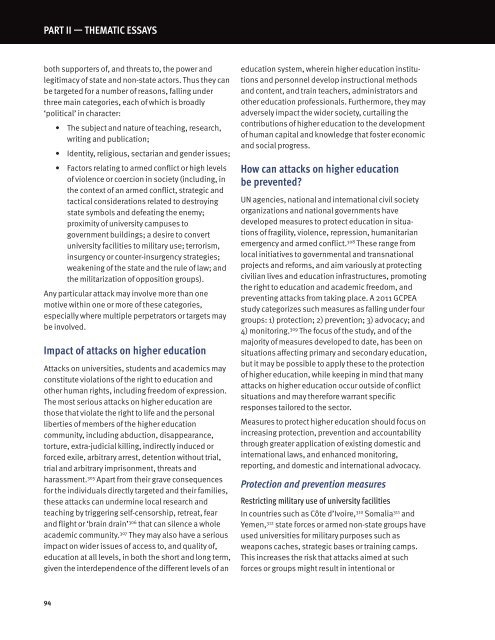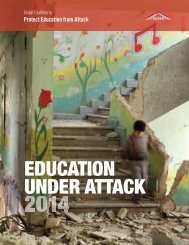Create successful ePaper yourself
Turn your PDF publications into a flip-book with our unique Google optimized e-Paper software.
PART II — THeMATIC eSSAYS<br />
both supporters of, and threats to, the power and<br />
legitimacy of state and non-state actors. Thus they can<br />
be targeted for a number of reasons, falling under<br />
three main categories, each of which is broadly<br />
‘political’ in character:<br />
• The subject and nature of teaching, research,<br />
writing and publication;<br />
• Identity, religious, sectarian and gender issues;<br />
• Factors relating to armed conflict or high levels<br />
of violence or coercion in society (including, in<br />
the context of an armed conflict, strategic and<br />
tactical considerations related to destroying<br />
state symbols and defeating the enemy;<br />
proximity of university campuses to<br />
government buildings; a desire to convert<br />
university facilities to military use; terrorism,<br />
insurgency or counter-insurgency strategies;<br />
weakening of the state and the rule of law; and<br />
the militarization of opposition groups).<br />
Any particular attack may involve more than one<br />
motive within one or more of these categories,<br />
especially where multiple perpetrators or targets may<br />
be involved.<br />
Impact of attacks on higher education<br />
Attacks on universities, students and academics may<br />
constitute violations of the right to education and<br />
other human rights, including freedom of expression.<br />
The most serious attacks on higher education are<br />
those that violate the right to life and the personal<br />
liberties of members of the higher education<br />
community, including abduction, disappearance,<br />
torture, extra-judicial killing, indirectly induced or<br />
forced exile, arbitrary arrest, detention without trial,<br />
trial and arbitrary imprisonment, threats and<br />
harassment. 305 Apart from their grave consequences<br />
for the individuals directly targeted and their families,<br />
these attacks can undermine local research and<br />
teaching by triggering self-censorship, retreat, fear<br />
and flight or ‘brain drain’ 306 that can silence a whole<br />
academic community. 307 They may also have a serious<br />
impact on wider issues of access to, and quality of,<br />
education at all levels, in both the short and long term,<br />
given the interdependence of the different levels of an<br />
education system, wherein higher education institutions<br />
and personnel develop instructional methods<br />
and content, and train teachers, administrators and<br />
other education professionals. Furthermore, they may<br />
adversely impact the wider society, curtailing the<br />
contributions of higher education to the development<br />
of human capital and knowledge that foster economic<br />
and social progress.<br />
How can attacks on higher education<br />
be prevented?<br />
UN agencies, national and international civil society<br />
organizations and national governments have<br />
developed measures to protect education in situations<br />
of fragility, violence, repression, humanitarian<br />
emergency and armed conflict. 308 These range from<br />
local initiatives to governmental and transnational<br />
projects and reforms, and aim variously at protecting<br />
civilian lives and education infrastructures, promoting<br />
the right to education and academic freedom, and<br />
preventing attacks from taking place. A 2011 GCPEA<br />
study categorizes such measures as falling under four<br />
groups: 1) protection; 2) prevention; 3) advocacy; and<br />
4) monitoring. 309 The focus of the study, and of the<br />
majority of measures developed to date, has been on<br />
situations affecting primary and secondary education,<br />
but it may be possible to apply these to the protection<br />
of higher education, while keeping in mind that many<br />
attacks on higher education occur outside of conflict<br />
situations and may therefore warrant specific<br />
responses tailored to the sector.<br />
Measures to protect higher education should focus on<br />
increasing protection, prevention and accountability<br />
through greater application of existing domestic and<br />
international laws, and enhanced monitoring,<br />
reporting, and domestic and international advocacy.<br />
Protection and prevention measures<br />
Restricting military use of university facilities<br />
In countries such as Côte d’Ivoire, 310 Somalia 311 and<br />
Yemen, 312 state forces or armed non-state groups have<br />
used universities for military purposes such as<br />
weapons caches, strategic bases or training camps.<br />
This increases the risk that attacks aimed at such<br />
forces or groups might result in intentional or<br />
94



